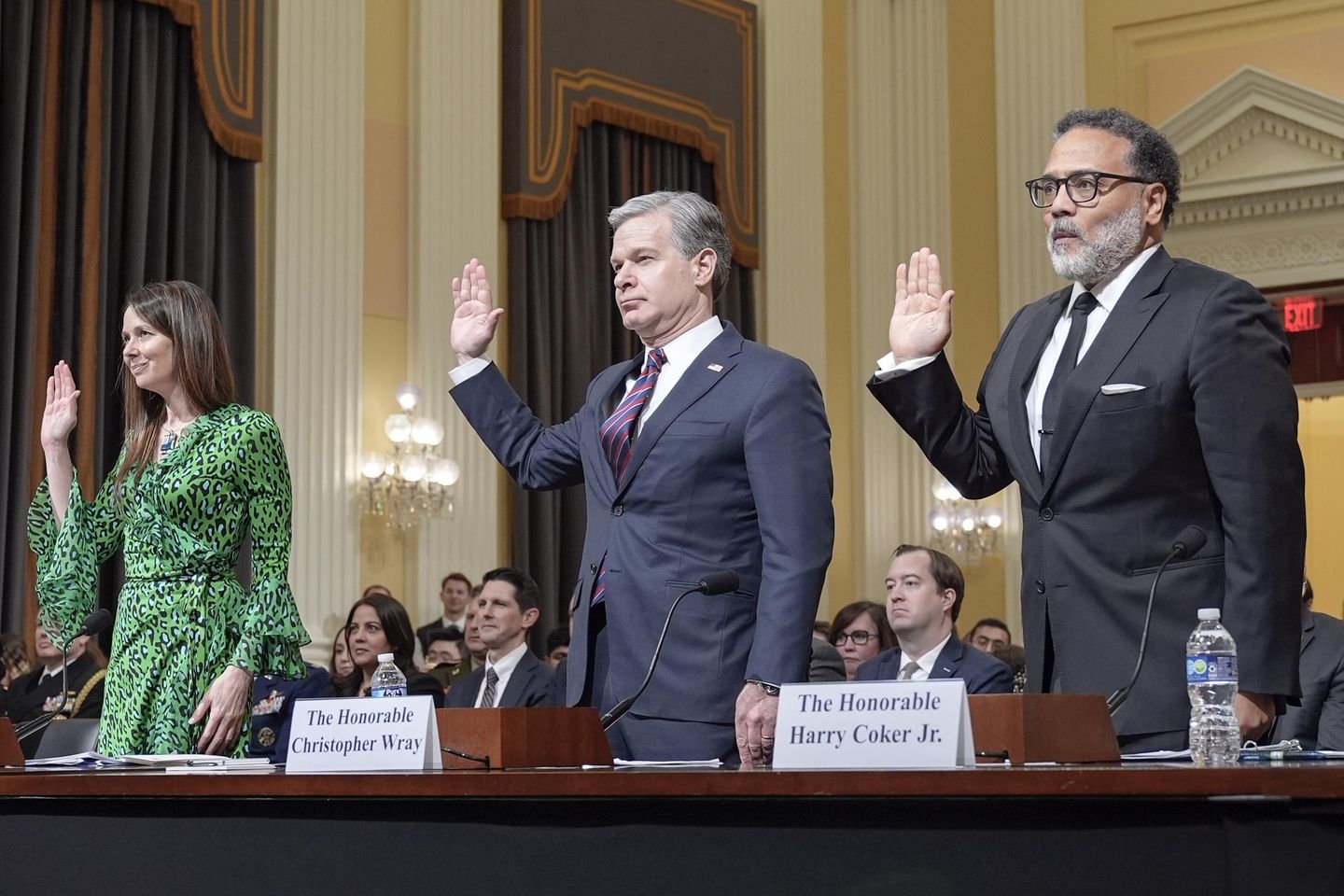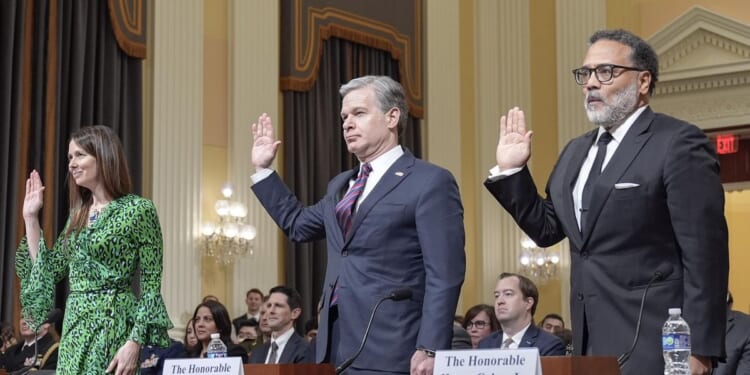
National security officials have mounted a full-court press in recent weeks to try to head off major changes to the government’s most important snooping authority, warning Capitol Hill that terrorists will benefit if lawmakers require the FBI to get a warrant before querying Americans’ names in its massive trove of data.
FBI Director Christopher A. Wray strove to drive home the dangers to Congress in appearances over the last month, telling them that the kinds of cases where the bureau is using the data — emails, texts, phone calls — to look for Americans’ information are too time-sensitive to wait for a warrant.
From stopping terrorist plots to spotting cyberattack victims to derailing the flow of fentanyl, he and other top officials said few areas of law enforcement aren’t affected by the government’s ability to collect reams of electronic data under Section 702 of the Foreign Intelligence Surveillance Act.
Mr. Wray said the FBI is open to tweaks but cannot accept major changes without losing some of the power that makes Section 702 the backbone of U.S. intelligence operations.
“It would blind us to information already lawfully in our possession that we need to be able to review and act on in a very time-sensitive way to be able to stop terrorist attacks, protect a victim from a cyberattack, warn somebody who is potentially targeted with assassination or kidnapping,” he told lawmakers.
Congress is racing toward an April 19 deadline for the expiration of Section 702. Nearly all members agree that the program needs changes, particularly after a series of damning reports about abuses in the top-secret program. But lawmakers disagree on how far to go.
The House is slated to take up the fight first with a bill reaching the floor this week, after several previous false starts.
Sponsored by Rep. Laurel Lee, Florida Republican, the bill contains several changes that Mr. Wray and the intelligence community can stomach and skips the warrant requirement the FBI doesn’t want.
Lawmakers are expected to have a chance to add the warrant requirement through the amendment process on the House floor.
Speaker Mike Johnson asked colleagues in a letter on Friday to get behind the bill.
He said Section 702 powers “have been essential to intercepting communications of dangerous foreign actors overseas, understanding the threats against our country, countering our adversaries, and saving countless American lives.”
“However, as a former constitutional law litigator and chair of the House Judiciary’s Subcommittee on the Constitution, I can state unequivocally that the FBI terribly abused the FISA authority in recent years, and in turn, violated the trust and confidence of the American people,” the Louisiana Republican wrote.
Mr. Johnson said that if this version of Section 702 had been in place when Donald Trump was running for election in 2016, the “baseless attack against his campaign would never have been possible.”
In addition to the warrant issue, FISA reformers also want language that would bar the government from buying data on the commercial market to sidestep constitutional protections that would prevent them from getting the data directly without a warrant.
Sen. Ron Wyden, an Oregon Democrat who has pressed the government to reveal the extent of its purchases of private data, said things have gotten out of hand.
“It is the Wild West out there in terms of sensitive information on Americans, and the government can buy it up. Unlike normal intelligence collection, there are apparently virtually no rules here,” he told Mr. Wray and other intelligence community leaders in a hearing last month.
Director of National Intelligence Avril Haines insisted the government is already policing itself and she said requiring the government to show it has probable cause before obtaining the commercially available data would be too much of a hurdle.
Sen. Mark Warner, Virginia Democrat, also worried that the U.S. would be unilaterally disarming if foreign governments could still buy the data but the U.S. could not.
Section 702 allows the government to collect massive amounts of electronic traffic from foreigners living abroad, though Americans’ communications can be scooped up if they are communicating with foreign targets. The controversy arises when the FBI wants to run an American’s identity against the data.
The program has been controversial from its start in 2007 and Congress has required it to be renewed every five years or so as a way of forcing a recurring debate on how it is working.
This time around that debate has been shaped by the FBI’s use of FISA to target the Trump campaign in 2016.
A 2019 report by the Justice Department inspector general found at least 17 bungles by the FBI in its application under FISA to conduct surveillance on Carter Page, a foreign policy adviser to the 2016 Trump campaign, over purported ties to Russia.
Among those bungles was an FBI lawyer altering an email to conceal the fact that Mr. Page had served as a source for the CIA. That information could have cut against the government’s case that he deserved to be probed.
The court that oversees FISA, in two opinions unsealed last year, also said Section 702 had been used to vet some would-be immigrants and probe Black Lives Matter activists, political donors and the Jan. 6, 2021, attack on the Capitol.
Mr. Wray told lawmakers he’s cleaned things up. He said the court has found 98% compliance with the reforms the FBI has already put in place.
“I think legislation that ensures those reforms stay in place but also preserves the agility and the utility of the tools [is] what we need to be able to protect the American people,” he told Congress.
Officials said the government already collects the Section 702 data through court-approved means, and adding a new layer of a warrant before the FBI can go looking through data it already has would be breaking new — and risky — legal ground.
Among the changes in the new bill are provisions:
• Limiting the number of FBI employees who can access Section 702 and requiring them to face annual training.
• Requiring prior approval from the deputy director of the FBI for queries involving sensitive matters such as involving a U.S. elected official, a journalist or a major religious figure.
• Requiring FBI to prepare a prior written statement of factual basis supporting U.S. person query search.
• Prohibiting political appointees from approving 702 queries by the FBI.
• Pushing for disciplinary action, including termination or suspension without pay, for intentional misconduct.
Intelligence officials say a majority of items in the president’s daily security briefing are based on data obtained from Section 702.
Ms. Haines called it “absolutely fundamental to every aspect of our work” and CIA Director William Burns said it was “crucial” to the U.S. being able to launch assassination strikes against al Qaeda leader Ayman al-Zawahri and Islamic State leader Haji Abdullah, both in 2022.
He also said 70% of CIA disruptions of synthetic drug operations were based on Section 702 data.












